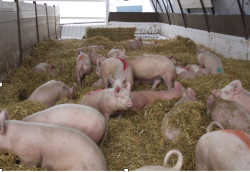This webinar took place on October 17, 2024.
About the Webinar
 Feed costs represent 65 to75% of the total cost to produce a market hog and have a significant impact on profitability of organic pig farming. Utilizing grains harvested from winter cover crops (e.g. hybrid rye and camelina) as a feed ingredient for pigs can potentially protect the environment and reduce feed costs of organic pig production. In this webinar, we will discuss how supplementing hybrid rye or camelina press-cake in pig diets can influence pig growth, pork quality, and potential savings on feed and bedding based on research conducted at the University of Minnesota. We will discuss the best practices in organic pig production and key factors for saving production costs. The webinar will help farmers improve organic pig production efficiency and make decisions on raising small grains for organic pigs.
Feed costs represent 65 to75% of the total cost to produce a market hog and have a significant impact on profitability of organic pig farming. Utilizing grains harvested from winter cover crops (e.g. hybrid rye and camelina) as a feed ingredient for pigs can potentially protect the environment and reduce feed costs of organic pig production. In this webinar, we will discuss how supplementing hybrid rye or camelina press-cake in pig diets can influence pig growth, pork quality, and potential savings on feed and bedding based on research conducted at the University of Minnesota. We will discuss the best practices in organic pig production and key factors for saving production costs. The webinar will help farmers improve organic pig production efficiency and make decisions on raising small grains for organic pigs.
About the Presenter
Dr. Yuzhi Li is a professor of organic swine production at the University of Minnesota’s West Central Research and Outreach Center, located in Morris, MN. She has led several organic swine projects sponsored by the USDA Organic Research and Extension Initiatives (OREI). The overarching goals of these projects are to develop systematic strategies that reduce feed costs, maintain pig performance, and minimize negative environmental impacts of organic pig production.



